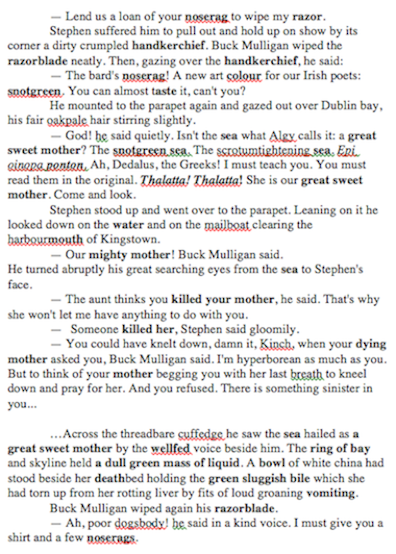Joyce had a lifelong aversion to hyphens. When words needed
to be combined, he made one compound word. Examples like
"stairhead," "dressinggown," and "gunrest" do not call much
attention to themselves, but the novel soon introduces more
startling examples. When Mulligan uses the English idiom "nose
rag" he gives it the same unbroken form as the more proper
"handkerchief": "Lend us a loan of your noserag to wipe my
razor.” Other compounds follow: “snotgreen,” “oakpale,”
“snotgreen," "harbourmouth," "cuffedge," "dogsbody," and, most
strikingly, “scrotumtightening.” The sentences in this part of
Telemachus also display another feature of Joycean
language that shaped A Portrait and continues
throughout Ulysses: repetition of words or phrases
to induce meditation and accumulate resonance.
The snotgreen sea soon becomes linked with the green bile
that Stephen’s mother vomited into a bowl, and Stephen’s
mother comes into the conversation because Mulligan calls the
sea “our great sweet mother,”
“Our mighty mother!” The
green sea becomes “a bowl of bitter
waters” like the one beside the bed. And the waters are
bitter not only because they remind Stephen of his mother’s
suffering but also because a Yeats song which he sang
for her mentions “love’s bitter mystery.” Stephen's fear of drowning in the sea
becomes linked with his fear of being swallowed up in guilt
over the mother whom he loves and fears. Words generate more
words in Ulysses, and the reader will soon discover
that this can happen not only in adjoining paragraphs but also
across vast distances.
In these several paragraphs, which are not at all unusual in
Ulysses, one encounters something like a prose poem
in which words clump together, separate, generate new words,
associate in new ways. The image at right identifies
interpenetrating clusters of sound and sense:
nose, snot, mouth, taste, eating, vomiting, bile
sea, water, liquid, bowl, bay
the color green
razor, blade, killing, death
mothers
This prose poem (constructed, admittedly, by the
note-writer's decision to excerpt several paragraphs of
Joyce's narrative) begins with attention to the word
“noserag,” and ends in the same way. It could have started
earlier, beginning perhaps with the bowl in which Mulligan has
stirred his lather, or Stephen’s fear of drowning in the
sea.
